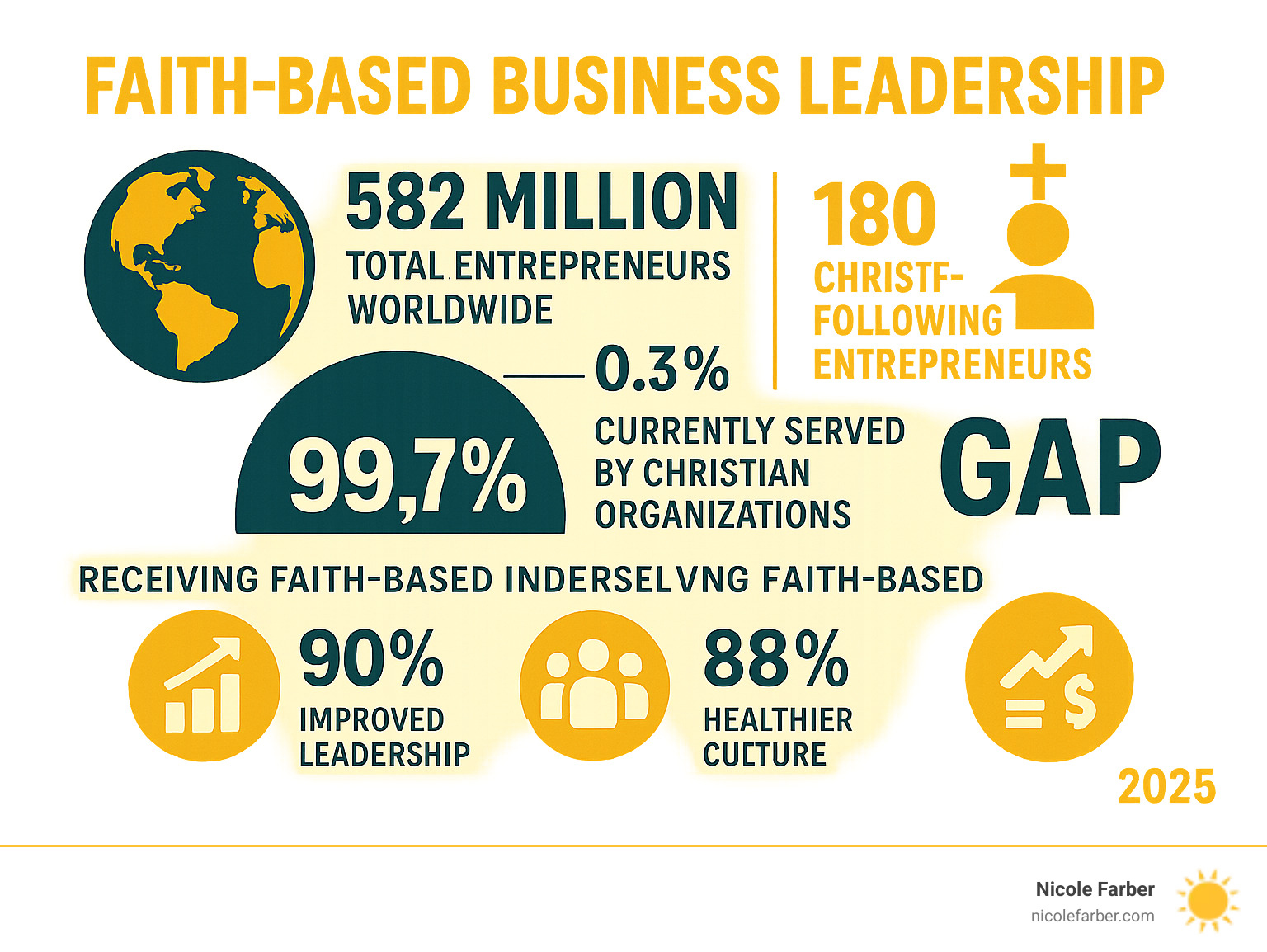Faith in Business: Beyond the Bottom Line
- Faith
- In the News
- September 15, 2025
Why Faith-Based Business Leadership Matters More Than Ever

Faith-based business leadership integrates spiritual principles into the fabric of a company. It moves beyond a profit-only mindset to create workplaces built on integrity, servant leadership, and genuine care for people. This approach is defined by putting employees’ well-being first, making ethical decisions, managing resources wisely, and aligning business goals with a purpose that positively impacts the community.
Globally, there are an estimated 180 million Christ-following entrepreneurs out of 582 million total. Yet, a staggering 99.7% of them lack dedicated community or resources from Christian organizations. This gap highlights a massive opportunity. Research shows that when leaders find faith-based peer support, the results are powerful, with many reporting significant leadership improvement, healthier company cultures, and better financial performance.
Having spent over 15 years helping businesses grow while maintaining their values, I’ve seen how faith-based business leadership transforms workplaces. Whether working with firms in Philadelphia, Wilkes-Barre, or communities like Antigua Guatemala, the principles and their remarkable results are consistent. When leaders integrate their deepest values into their business, they create something far more meaningful than profit alone.

Faith-based business leadership glossary:
The Foundations: Core Principles of Faith-Based Business Leadership
Building a business on faith means weaving timeless biblical principles into your daily operations. These aren’t just nice-to-have guidelines; they are the bedrock for creating workplaces where people and businesses flourish long-term.

When I work with leaders from Philadelphia to Wilkes-Barre, I see that aligning Monday’s decisions with Sunday’s convictions changes everything—not just the bottom line, but the entire company culture. Faith-based business leadership means your values show up in your contracts, conversations, and purpose. If you’re looking to explore how faith can guide your journey, our Christian Life Coaching resources offer deeper insights.
Servant Leadership: The Upside-Down Model
While the world often celebrates a “climb to the top” mentality, faith-based leadership follows a different model. In Mark 10:45, Jesus shows that true leadership means serving others. This servant leadership approach flips traditional hierarchy on its head. Instead of hoarding power, you empower your employees. Instead of taking credit, you foster their growth. When leaders put others first, they gain influence, engagement rises, and innovation flourishes.
Integrity and Honesty as a Cornerstone
Proverbs 11:3 states, “The integrity of the upright guides them.” In business, this means your word is your bond and your dealings are transparent. Building trust is smart business. When clients, employees, and partners see your ethical decision-making, you create an invaluable reputation. I’ve seen businesses in Luzerne County and New Orleans thrive by choosing honesty over shortcuts. Integrity may have short-term costs, but it pays dividends in long-term sustainability.
Wise Stewardship: Managing More Than Money
The Parable of the Talents (Matthew 25:14-30) teaches that stewardship extends beyond the bank account. Every resource—financial, human talent, and community impact—requires purposeful management. This means investing in your people’s growth, using profits to bless your community, and making decisions that honor both current stakeholders and future generations. Your business becomes a vehicle for positive change.
Defining Your Venture: Purpose-Driven vs. ‘Soulful Enterprise’
While “purpose-driven” is a great concept, faith-based business leadership often creates a “Soulful Enterprise.” This type of company explicitly integrates faith principles into its core operations, viewing the business itself as an act of worship. This approach is deeply inclusive, creating an environment where all people feel valued because they are recognized as image-bearers of God. Your faith guides your leadership, creating a culture of respect and dignity. For more insights on how faith shapes leadership, explore our thoughts on Faith.
From Principle to Practice: Integrating Faith into Daily Operations
The real test of faith-based business leadership is how we handle daily challenges—the difficult conversation, the temptation to cut corners, or the response to market pressures. It’s about taking our Sunday convictions into our Monday meetings.

Integrating faith means weaving biblical principles into every policy and interaction. Whether you’re running a law firm in Philadelphia or a team in Wilkes-Barre, the goal is to honor God through daily business practices. For deeper insights, explore our Business Leadership Strategies.
Practical Steps for Faith-Based Business Leadership in Decision-Making
While spreadsheets and market research are valuable, faith-based business leadership adds divine wisdom through prayer and discernment. Start important decisions with prayer, asking for clarity before diving into the numbers. Seeking wise counsel is also vital. As Proverbs teaches, there is wisdom in many advisors. A trusted mentor or peer group can help you see blind spots.
The goal is aligning every decision with core values. Before making a major decision, ask:
- Does this align with our principles of integrity, stewardship, and servant leadership?
- Have we sought God’s wisdom and consulted with trusted advisors?
- How will this impact our employees, customers, and community?
Building a Culture of Compassion and Respect
The Golden Rule—”Do to others what you would have them do to you”—is a powerful business strategy. Creating a culture of compassion starts with caring for people as whole human beings. This makes work-life balance more than a buzzword; it means being flexible and celebrating personal milestones. Gratitude and recognition should flow naturally, and even forgiveness in the workplace plays a role. When mistakes happen, respond with grace to create space for learning and growth.
Fostering Ethical Behavior and Accountability
Leading by example is the foundation of an ethical culture. Your team watches how you handle pressure and treat others. A clear code of ethics helps, but daily actions give it meaning. This includes ensuring fair treatment for all and avoiding favoritism. Creating accountability structures, like open-door policies or feedback channels, allows concerns to be raised safely. This approach creates a workplace where people want to do their best work because they feel valued, respected, and part of something meaningful.
Navigating the Marketplace: Overcoming Common Challenges
Running a business with faith at its center doesn’t eliminate challenges; it equips us to face them with wisdom and courage. The marketplace doesn’t always reward virtue, and doing the right thing can feel like swimming upstream.

I’ve seen this with leaders from the business environment of Philadelphia to the communities of Wilkes-Barre. Our faith isn’t meant to shield us from challenges but to equip us to face them. When we learn to walk by faith, not by sight, we find unexpected strength.
The Challenge of Leadership Loneliness
Leadership can be an isolating job, a top struggle for many Christian CEOs. You carry the weight of decisions and everyone’s livelihood, yet it’s hard to find someone who understands. Complaints flow up, but where do you take yours? This isolation can feel intense in business communities like Wilkes-Barre or New Orleans. Christian leaders often feel pressure to have it all together, but we are human and need peers who understand both the weight of leadership and the journey of faith.
Balancing Profit with God-Given Purpose
Every faith-driven leader faces the tension between honoring God and meeting market demands. Shareholders want returns, employees need fair wages, and customers expect competitive prices. Mission drift can happen when we slowly compromise values for short-term gains. But we also know that “no margin means no mission.” Staying true to your values while remaining profitable, whether in Philadelphia or Luzerne County, requires constant vigilance and wisdom.
Staying Resilient Through Faith in Turbulent Times
Business is unpredictable. In moments of crisis, faith-based business leadership provides an unshakeable foundation. Philippians 4:13 reminds us, “I can do all this through him who gives me strength.” This isn’t a promise of an easy path, but a guarantee that we won’t face it alone. Faith provides clarity in the chaos. Leaders in places like Antigua Guatemala, who endure incredible hardship, understand that resilience isn’t about avoiding the storm but learning to dance in the rain. Faith provides a perspective beyond quarterly reports, allowing us to lead from a place of peace, not panic.
Stronger Together: The Role of Community and Mentorship
The path of faith-based business leadership is not meant to be walked alone. One of the greatest gifts we can give ourselves is a community of trusted relationships that provide wisdom, accountability, and support.

As someone who has steerd the challenges of building a business as a single mother, I know the right community makes all the difference. Whether you’re in Philadelphia’s competitive market or Wilkes-Barre’s tight-knit community, having people who understand your journey is invaluable. We’re not just networking; we’re building genuine connections. For more on how we support leaders, explore our resources on Empowering Women Entrepreneurs.
The Power of Peer Advisory Groups
When you bring a small group of non-competing business leaders together regularly, something powerful happens. These peer advisory groups become safe havens for honesty and perspective. The data on such groups is compelling: members often report significant leadership improvement, healthier company cultures, and better financial performance. Beyond the numbers, these groups address the profound loneliness of leadership. A leader who feels isolated can find a brotherhood or sisterhood that provides both challenge and support, whether in New Orleans or Luzerne County.
Finding and Being a Godly Mentor
The mentor-mentee relationship is a powerful force in faith-based business leadership. A godly mentor helps you integrate your faith and work, shares wisdom from their own journey, and prays with you through tough decisions. But being a mentor is just as transformative. When we invest in emerging leaders, we help shape the next generation of leaders who will carry kingdom principles into their workplaces. This is crucial in communities like Philadelphia and Wilkes-Barre, where strong leadership creates ripple effects. My journey as a Female Leadership Speaker has shown me the power of this investment.
Global and Local Community Impact
Faith-based business leadership naturally extends into the communities we serve. Our businesses are vehicles for positive change. This might look like creating jobs in your city or supporting economic development initiatives that lift entire communities, from Philadelphia to Antigua Guatemala. Locally, we contribute to economic health and become known for our values. Globally, we can support missions and fair trade initiatives. This creates a sense of purpose that transforms how your team shows up every day, knowing their work is contributing to something meaningful.
The Ripple Effect: How Faith Transforms Business Success
When you commit to faith-based business leadership, the principles flow throughout your organization, creating waves of positive change that touch everyone.

I’ve witnessed this change in businesses from Philadelphia to Wilkes-Barre. When leaders integrate faith into daily operations, employees become more engaged, customers develop deeper loyalty, and the business becomes a force for good. The servant leadership model is the catalyst for these outcomes, inspiring purpose in your team. For more insights, explore our guide on How to Become an Effective Leader.
The Impact of Faith-Based Business Leadership on Company Culture
When you lead with faith, your company culture transforms organically. It’s a natural outcome of consistently applying values like integrity and compassion. Research shows that CEOs in faith-based business forums achieve healthier company cultures. Trust becomes the bedrock, creating psychological safety where employees know their leaders care about them as whole people.
| Metric | Typical Workplace | Faith-Led Workplace |
|---|---|---|
| Employee Turnover | Higher, due to disengagement | Lower, due to loyalty & purpose |
| Employee Engagement | Often compliance-driven | Mission-driven, authentic |
| Job Satisfaction | Linked to compensation | Linked to purpose & values |
| Collaboration | Often competitive | Encouraged, supportive |
| Trust | Earned, often fragile | Foundational, openly built |
Enhancing Employee Well-being and Engagement
Faith-based business leadership changes how we view employees—we see them as people to be valued, not resources to be maximized. This shift has tangible benefits. Servant leadership helps prevent burnout by encouraging real work-life balance. The result is genuinely engaged employees who understand how their work fits into a larger mission. Whether in a New Orleans agency or a Philadelphia firm, this sense of purpose transforms everything. People feel safe to share ideas and take risks because they know their leaders have their backs.
Driving Sustainable Success and Positive Reputation
Contrary to what some skeptics believe, faith-based business leadership often leads to better financial performance. Data from faith-based business forums shows that a majority of members attribute improved financial results to the wisdom and accountability they gained. When you operate with integrity, customers trust you. When you treat employees well, they become your best ambassadors. Companies that live out their values attract top talent and build customer loyalty that transcends price. You’re not just building a business; you’re creating a legacy that can weather storms and thrive for generations.
Frequently Asked Questions about Faith-Based Business Leadership
Leading with faith in today’s world brings up important questions. Whether you’re in Philadelphia’s competitive market or building a team in Wilkes-Barre, these concerns are universal. Here are answers to the most common questions I hear.
How can I lead with faith in a secular or diverse workplace without imposing my beliefs?
This is a common and important question. The key is to live out your values, not preach them. Focus on universal principles that define great leaders: integrity, compassion, excellence, and genuine care. Your actions become your testimony. When you treat employees with dignity, make ethical decisions, and lead with humility, you demonstrate your faith without saying a word. People in diverse cities like New Orleans may not share your beliefs, but they will respect your character. Create an environment where everyone feels valued, and you will be living out biblical principles in a way that blesses everyone.
What is the first practical step I can take to integrate my faith into my business today?
Start with honest self-reflection. Identify one specific area where your business practices and faith values can align more closely. Perhaps it’s committing to complete honesty in all communications or starting each major decision with prayer. A simple first step I recommend to leaders in Luzerne County and beyond is to begin your day with a brief prayer for your business and team. Ask for wisdom and opportunities to serve. Another small step is to apply the Golden Rule to every interaction for a week. Small, consistent steps build sustainable momentum.
How do you measure the “success” of a faith-based business beyond financial metrics?
This question gets to the heart of faith-based business leadership. While financial health is vital, success runs deeper. Measure success by looking at:
- Company Culture: Do people enjoy their work? Is turnover low? Is there genuine collaboration?
- Employee Well-being: Are team members growing personally and professionally? Do they have a healthy work-life balance?
- Community Impact: How is your business making a positive difference? This includes the jobs you create, the ethical standards you model, and the causes you support in places from Philadelphia to Antigua Guatemala.
- Personal Growth: Are you, as a leader, becoming more patient, wise, and compassionate? This change in character is a key success metric.
The goal is not to choose between profit and purpose; it’s to find that when you lead with faith, both can flourish.
Conclusion
Our journey into faith-based business leadership shows it’s a transformative way of doing business that changes everything—from our decisions to our definition of success. We’ve explored the core principles of servant leadership, integrity, and stewardship, and seen how they shape cultures from Philadelphia boardrooms to New Orleans startups.
The challenges, like leadership loneliness and balancing profit with purpose, are real. But we’ve also seen the power of community and mentorship in overcoming these obstacles. The ripple effect is clear: leading with faith results in healthier cultures, more engaged employees, and sustainable success that goes beyond the bottom line. Research confirms that faith-based leaders see significant improvements in their leadership and workplace culture.
My own journey as a single mother building a business has taught me that faith-based business leadership is a daily choice, not a destination. Some days are better than others, and that’s part of the process.
Whether you lead a team in Antigua Guatemala or a large organization in Wilkes-Barre, the principles are the same. It’s about building businesses that create lasting impact and honor God. You don’t have to transform everything overnight. Start where you are. Choose one principle to focus on this week. Seek out a mentor. Pray before your next big decision.
Your journey matters. The world needs leaders who act with integrity and lead with love. If you’re ready to inspire your team with purpose-driven leadership, I’d love to help. Consider how we can Transform your team with a Motivational Leadership Keynote Speaker who understands this journey firsthand.